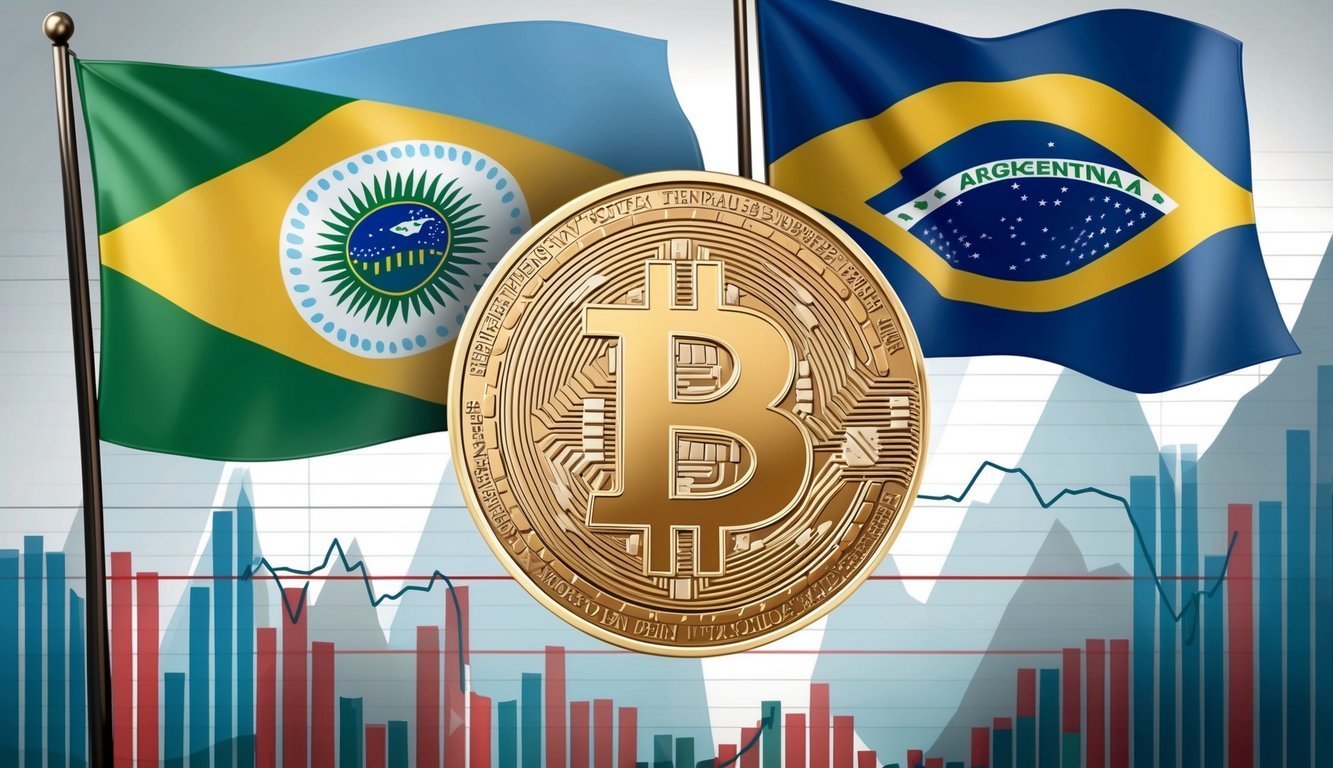In recent months, a significant trend has emerged in Argentina and Brazil as large corporations begin to weave Bitcoin into their financial strategies, particularly by establishing BTC-based treasuries. This movement signals a broader transformation across Latin America, motivated by the urgent need for robust inflation hedges and diverse asset portfolios.
Corporate Adoption of Bitcoin
While the United States observes a gradual conversation around cryptocurrency’s role in corporate reserves, firms in Argentina and Brazil are already reaping the benefits of Bitcoin investments. This proactive approach mirrors initiatives by influential entities like Strategy (formerly MicroStrategy) and El Salvador’s national Bitcoin program.
Notably, BitcoinTreasuries.NET reports that three leading Argentine companies—including Mercado Libre, recognized as the largest publicly traded firm in Latin America—collectively hold 1,300 Bitcoin. This increasing embrace of cryptocurrency has been further energized by President Javier Milei, who has adopted a pro-Bitcoin policy since taking office over a year ago, advocating for deregulation and conditions that are favorable to crypto transactions.
Key Players in the Cryptocurrency Market
Regional standout Bitfarms, founded by Argentine entrepreneurs but based in Canada, has emerged as the predominant Bitcoin holder in Latin America with 870 BTC. Since its inception in 2017, Bitfarms has maintained robust production rates, averaging 250 Bitcoin monthly in 2024, supported by operations spread across Argentina, Paraguay, Canada, and the U.S.
Mercado Libre—the “Amazon of Latin America”—is also a crucial player in the cryptocurrency arena. With a market cap of $100 billion, the company started investing in cryptocurrencies a few years back. By 2021, its total investments approached $10 million, heavily focused on Bitcoin and Ethereum. Currently, it holds over 412 BTC and 3,040 Ether, valued at nearly $50 million. Founder Marcos Galperín champions Bitcoin as a superior store of value when compared to gold.
Economist and crypto analyst Natalia Motyl asserts that the growing interest in cryptocurrencies among Argentine companies isn’t a passing trend; instead, it represents a movement that has been gaining traction since 2021. Businesses are increasingly tapping into cryptocurrencies as safe-haven investments. The chronic inflation that has plagued Argentina for years has pushed companies and individuals to explore alternative financial routes in a landscape marked by fragile local currencies.
Fintech Innovation and Growth
While these companies have made substantial investments in Bitcoin, it’s essential to recognize that they don’t yet reach the levels seen in giants like Strategy, which boasts a portfolio of nearly half a million BTC. Engaging with cryptocurrencies goes beyond mere investment; it also serves to enhance corporate branding.
In addition to direct treasury holdings, the interest among Latin American fintech companies in the cryptocurrency realm is rapidly expanding. There’s a recognition of rising adoption rates among the population, coupled with the identification of significant business opportunities. Mercado Libre, which serves over 50 million users in the region, has introduced a stablecoin, dubbed the “Meli dollar,” specifically targeting its most substantial market, Brazil. This follows a previous token launch aimed at enriching user engagement through a loyalty program.
Argentina stands out in Latin America as a hotspot for cryptocurrency transactions, prompting major corporations to integrate crypto into their business models for various purposes, whether for payments, investments, or as a means of storing value.
Another notable figure in this landscape is Nubank, a Brazilian bank partly owned by Warren Buffett’s Berkshire Hathaway and boasting over 100 million customers across Brazil, Colombia, and Mexico. Nubank has steadily expanded its cryptocurrency services since introducing trading options in 2022, responding to growing demand from clients eager to exchange cryptocurrencies. In December, the bank announced that customers could swap BTC, ETH, SOL, and UNI for USDC and vice versa. Remarkably, up to 30% of its user base reportedly holds USDC in their portfolios.
Nubank’s executive director of cryptocurrencies and digital assets articulated that this gradual introduction of swaps aligns with evolving client strategies for integrating crypto assets, enabling users to maximize potential gains while managing transaction costs and maintaining market exposure. Through these developments, the landscape of cryptocurrency in Latin America continues to evolve, reshaping the financial strategies of its corporations.
Source: Cointelegraph





